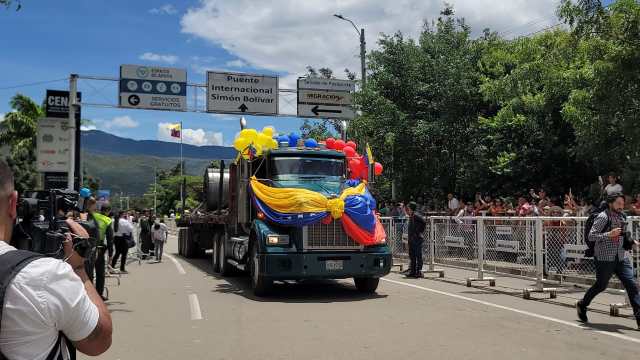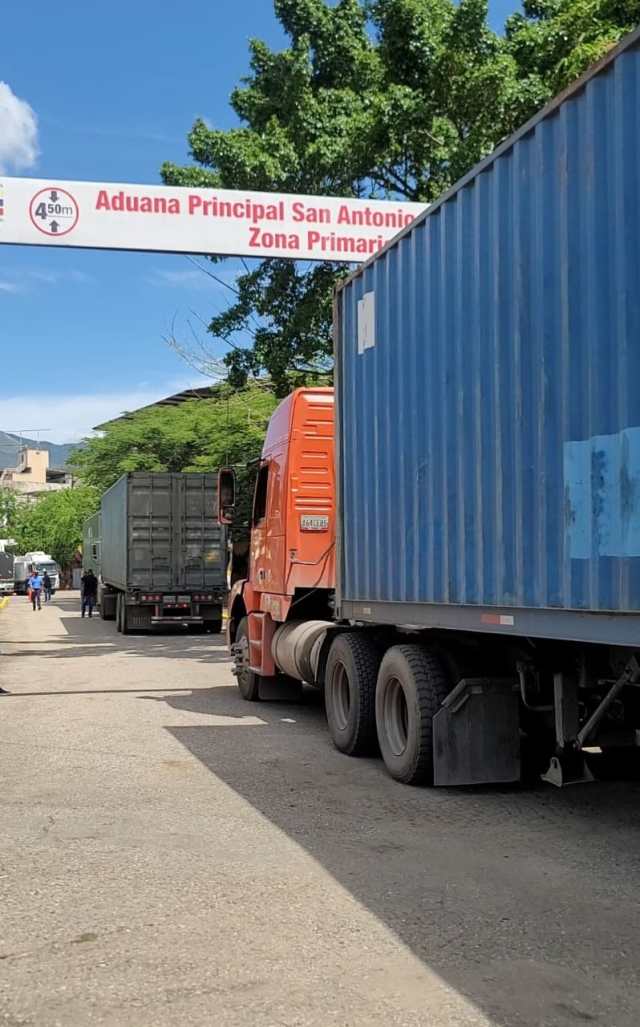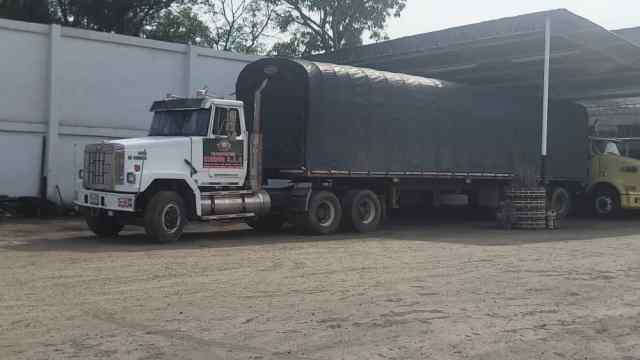
Nearly one million dollars has been reported by Colombia in exports from the Free Trade Zone of the city of Cúcuta to the border municipalities of Táchira State, and more than 300 thousand dollars has been exported by Venezuela to the brother country, through the international bridges Francisco de Paula Santander and Simón Bolívar, after the binational border reopening that was attended by the Colombian President, Gustavo Petro, on September 26th, as reported by Sandra Guzman, Director of the Colombian Federation of Logistics Agents of International Trade of Colombia (FITAC).
By Luz Dary Depablos / Correspondent LaPatilla.com
The resumption of commercial relations between the two countries initially generated uncertainty among Colombian and Venezuelan operators due to a failure originated in the “Sidunea Word” national system (Seniat customs platform), implemented since July and enabled since July 26th of September at the Main Customs Office in San Antonio del Táchira and its Subordinate Customs. This generated the collapse of a section in the system on September 27 that did not recognize the Partial Scope Agreement no. 28 with Colombia, which exempts the payment of import taxes for goods of Colombian origin.
This situation therefore affected the development of customs declarations for the import of Colombian merchandise through land, air and sea ports throughout Venezuela, explained Albaro Paz, President of the Chamber of Cargo Transportation of Táchira State, a dissimilar situation not present with Venezuelan goods entering Colombia on the same date, which were declared before the National Tax and Customs Office (Dian) of Cúcuta, where the Apcol-28 agreement was recognized.
Once the failure of the customs system was overcome, operations on the Venezuelan side began to function smoothly at last, that is: “the lapses for customs processes are being fulfilled in a timely manner, the entire foreign trade logistics chain involved (Agency of Customs, Warehousing and International Freight Transport) is developing its operations with total normality,” said Albaro Paz.

In the last two weeks it has been shown that dozens of Venezuelan importers have shown interest in participating in the commercial exchange through this border, so some have initiated the procedures required to obtain the permits required in Venezuela for importation and national transit of the merchandise.
Nelsón Urueña, President of the Association of Customs Auxiliaries of Táchira, reported that in a meeting held this Friday between officials of the National Institute of Comprehensive Agricultural Health (Insai) and representatives of the customs sector, it was agreed that in the coming days they will hold special sessions to expedite these procedures.
He also emphasized that they continue to re-acquire users who traditionally passed goods through this border, but since 2019 migrated to Paraguachón (Zulia State), as well as those who mistrust these border crossings (Táchira and Norte de Santander).
“All goods under the import or export customs regime are subject to the provisions of the Customs Tariff, a technical instrument where the universe of goods and the tax obligations are reflected, as well as the obligations regarding permits (legal framework) to which they must be submitted according to the type of merchandise,” said Vladimir Tovar, Director of Foreign Trade and Border of the Táchira Social Chamber of Cargo Transport.
Tovar stressed that, “products for human use and consumption must comply with permits established in the legal regime before the Ministry of Health, as well as products of plant origin (phytosanitary regulations) and those of animal origin (zoosanitary regulations), as well as supplies for agricultural and livestock production, must comply with the permits required by the Ministry of Agriculture and Land.”
On the other hand, Sandra Guzmán, director of Fitac, indicated that Colombia has exported to Venezuela supplies for footwear, low-density polyethylene, corrugated cardboard boxes, jean fabric, food processing machines, fertilizers, toilet paper, confectionery, disposable cups and medical supplies.
Meanwhile, Venezuela has exported to the brother country, steel coils, toiletry bags, mineral coal, scrap metal and molds for cast glass containers. “The coffee had to be returned to Venezuela on the instructions of Ica, since it did not meet the requirements that Colombia demands to enter,” explained Guzmán.

Gregorio Garzón, a Venezuelan businessman from a renowned supermarket chain in southwestern Venezuela and North Santander, Colombia, owner of the merchandise from one of the first trucks that formally entered Venezuela on September 26 through the Simón International Bridge Bolívar explained, “we have always exported from Colombia to Venezuela through Paraguachón, now we have the opportunity to do so through this border.”
He emphasized that: “it is much closer (the border crossing), and of course the costs of transportation, handling and logistics have been reduced, which means that the price for the final consumer tends to fall. Previously, the journey of a “gandola” (tractor mula, semi-trailer) through Paraguachón was 24 hours, today we can say that the same journey was reduced between four or six hours.”
Garzón also urged Venezuelan businessmen interested in commercial exchange with Colombia to join and work to recover their country’s economy.
A Venezuelan merchant, who asked not to be identified, used the “trocha code” or “Protector code” as the “permit” that authorized the regime for the passage of tons of merchandise through illegal paths/routes was known, said that at first he felt confused because “they had told us that the commercial reopening would only be symbolic and that in the following days the goods would pass through the trails again”, which is why he did not worry about getting the respective permits. Now he will start all the procedures to have all his documents in order and be able to bring his products legally through the formal roads.
Likewise, Italo Atencio, President of the National Association of Supermarkets and self-service stores of Venezuela, considers the reactivation of commercial exchange with Colombia to be good news, which in his opinion should be treated with joy, but with caution, since Venezuela has sectors that in the midst of the crisis have improved their production and supply, which is why it is necessary to protect them.
Atencio also noted that: “the assortment of Colombian merchandise could increase in items that are needed to improve supply (in Venezuela). We have to privilege the national products, because that increases the gross domestic product,” he pointed out.
Therefore, representatives of the business, customs and productive sectors of Venezuela and Colombia hope that a work and rapprochement agenda will be maintained between representatives of both countries, which will allow strengthening relations under complementarity to meet the needs of each nation. It should be noted that these relations were broken when Nicolás Maduro arbitrarily and unilaterally ordered the closure of the international bridges that link Táchira with Norte de Santander in August 2015.

